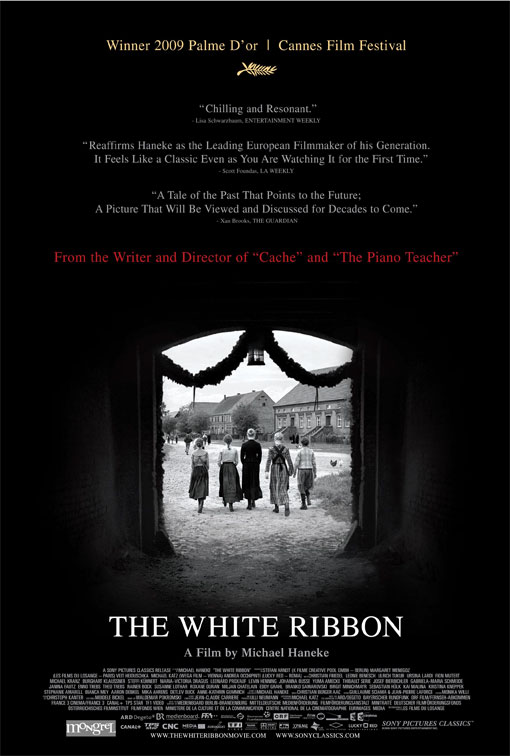 Michael Haneke, to put it lightly, is difficult. His newest feature, (which unfortunately just came to Eugene this week) Das weiße Band, 2009 Golden Palm winner at Cannes, is no exception. The only way I know how to describe it is imagining Bela Tarr had directed Haneke's earlier film Cache, which made a surprising number of best films of the 00's lists.
Michael Haneke, to put it lightly, is difficult. His newest feature, (which unfortunately just came to Eugene this week) Das weiße Band, 2009 Golden Palm winner at Cannes, is no exception. The only way I know how to describe it is imagining Bela Tarr had directed Haneke's earlier film Cache, which made a surprising number of best films of the 00's lists.The film moves at a very deliberate pace, yet never fails to engage. All the characters are fully developed. The dialogue is natural. The acting is tremendous, especially considering the extensive use of child actors in key roles.
It's the last point that I find most entrancing about the film (other than the spectacular camera work, a strong point in any Haneke film). The ensemble cast consists of a large number of children, and their acting generally outshines all but a few of their adult counterparts. Interestingly, the intrigue of the ability of these child actors is reflected in the perplexing narrative, which remains up for interpretation, as is generally the case in Haneke's films.
The movie itself tells the tale of a small German town on the eve of the first world war (a fact that's never really made clear until a character learns of Ferdinand's assassination about 2/3 of the way into the movie). In the town, a number of unexplained accidents happen, and the locals are terrified.
The viewer is left with nothing with questions by the end of the film. Like other Haneke films, the ultimate question is whether or not the questions the audience likely leaves with matter in the first place (I'm being intentionally vague in this review so as not to spoil anything). By not bringing reconciliation in an expected way, Haneke is really attacking the very cinematic idea of closure.
Haneke is a master filmmaker, and this is him at his finest. I'm not going to suggest that I was utterly blown away by the time the credits ran, but this movie really was next to perfect. From the preview, this made me think it would be something like The Village, without being awful. And in actuality, that's kind of what it was. Haneke presents the same kind of small village paranoia in a subtle way incomprehensible in mainstream American film as of late.
Given how incredibly excellent this film was (though, ultimately, I don't think it unseated Antichrist as my favorite film of 2009), I'm really excited to see El secreto de sus ojos, which nabbed the Oscar for best foreign language film this year (at which point I turned off the TV to avoid having to look at James Cameron anymore).

No comments:
Post a Comment